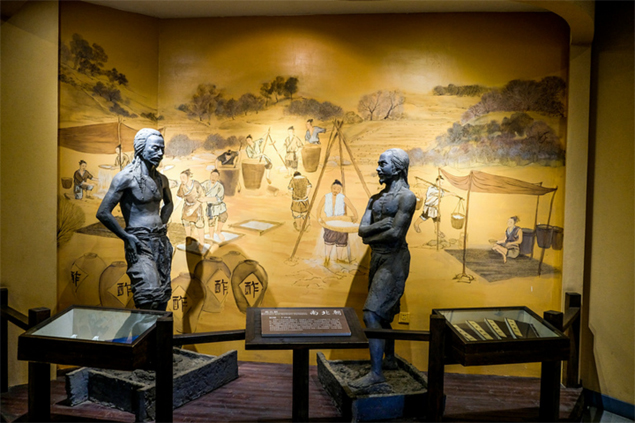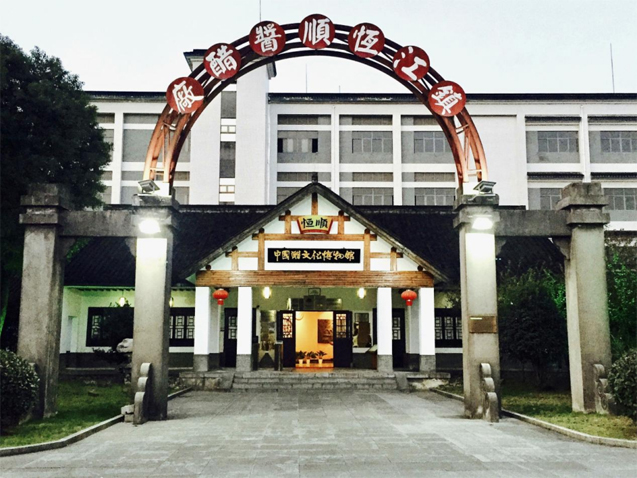The origin of Zhenjiang aromatic vinegar can be dated back to 2,600 years ago when there were workshops of aromatic vinegar in Zhenjiang. According to the legend of Zhenjiang, aromatic vinegar was made by the son of Du Kang. It is said that Du Kang took his family to Zhenjiang where he started a small distillery after he invented Chinese wine. The distillery was opened on the bank of the Yangtze River, directly facing the dragon nest in the river. There lived a little white dragon in the nest. The water was crystal clear and tasted sweet, which was used by Du Kang to produce wine. His son Heita carried water home every day. One day, he saw horses eating distiller's grains in the vat, so he added two buckets of water for them. In this way, the horses grew very strong.

One night in midsummer, an old immortal came into his dream and said, "The flavoring liquor you made is very delicious. May I have some?" Heita was confused and did not understand what was the flavoring liquor. The old immortal pointed to the vat beside him and said, "You have made it for 21 days, and it will become delicious by the time 05:00 pm and 07:00 pm today!" Heita told his father this dream after he woke up the next day. Du Kang tasted it and found the “flavoring liquor” was fragrant, sour, and sweet, so he named it vinegar.
The legend that "Du Kang made wine, and his son made vinegar" has been passed down from generation to generation. Later, the vinegar-making techniques were improved by local people, which made Zhenjiang vinegar characteristically "deep-colored, aromatic, sour, mellow and strongly flavored .
The Story of Drinking Vinegar
(I)
Legend has it that in the Tang Dynasty Prime minister Fang Xuanling was in high favor of Emperor Taizong. Fang’s wife had a reputation for being hot-tempered and loyal. On a banquet, the emperor bestowed on Fang two beautiful young ladies as his concubines. However, Fang Xuanling’s wife strongly disagreed. So, the emperor requested her presence and asked her to accept the concubines otherwise she would have to drink a glass of poisonous wine. Fang Xuanling’s wife took the poisonous wine and drank it all at once without any hesitation, yet nothing happened. It turned out to be a glass of aromatic vinegar. Emperor Taizong was shocked and said, “I am afraid of a woman like you, let alone Xuanling.” He recalled his royal order. Since then, the saying “drinking vinegar” has been used to mean the jealousy between men and women.
(II)
Su Dongpo, a poet of the Song Dynasty, visited the south of the Yangtze River many times, and created a number of famous poems. One day, he sightsaw in Jiaoshan Mountain with the Buddhist abbot of the Dinghui Temple. He wrote a well-known poem when he was tasting the famous Zhenjiang dish steamed shad: “The shad is steamed with ginger bud and purple vinegar, and I can use the white plate to eat more than two feet of fish. Here I can still smell the fragrance of peach blossoms, and the flavor of the shad is even better than that of my hometown.”
(III)
In the late Ming Dynasty, there was a couple who ran a pub in Zhenjiang. They were busy with celebrating the coming Spring Festival. The wife went to the street to buy some tea and food for her visit to her parents. She also bought a small bag of nitrate for making firecrackers. Unfortunately, the husband mistook nitrate for salt and preserved the pig's hooves in the nitrate. The couple did not know whether the hooves were edible or not, but they were unwilling to throw them away. An idea came into the mind of the wife. She washed the pig’s hooves and wanted to make new dishes with them. At that moment, an old man came, leading a donkey. As soon as he entered the pub, he asked, "What dish do you sell? It smells good." The wife replied, "Grandpa, that's nitrate-preserved meat. It is not a dish to offer.” The old man said, “It doesn’t matter. I can take it with a cup of tea.” The husband saw the old man insisting on eating the meat, so he offered a small plate of shredded ginger to remove the unpleasant smell. The wife put some vinegar onto the ginger to warm the stomach of the old man as the meat was too cold.
The old man dipped the meat in vinegar, picked up some shredded ginger and put it on the meat. He tasted a bite and found that the meat was fragrant, savory, and tender. The old man turned out to be Zhang Guolao, one of the Eight Immortals. He smelt the meat when he passed by Zhenjiang. He did not even go to the Fairy Peach Meeting of the Queen Mother of the West to jump off the donkey and eat nitrate-preserved meat in the pub.
After Zhang Guolao left, the couple continued to preserve pig’s hooves in this way and became well-known for their nitrate-preserved meat. They renamed it cured pork, which represented delicacies. The custom that “cured pork not served with meals” has been passed down. Today, local people in Zhenjiang still take the cured pork as a delicacy for morning tea or eat with a pot of tea. They usually put a plate of shredded ginger and dip the meat in vinegar.
Legend of the Origin of the Time-Honored Brand – Hengshun Aromatic Vinegar
Top-quality vinegar is always produced by famous factories. Zhenjiang Hengshun Soy Sauce and Vinegar Factory must be mentioned when we talk about Zhenjiang aromatic vinegar. The factory used to be a workshop of distiller's grains. Originally, it only made Chinese yellow rice wine (Baihua wine). Vinegar was not one of its products, and the workshop was not named “Hengshun”.

A legend goes about the workshop like this: The workshop owner opened a new pub and an old man came to the counter early in the morning with a pot claiming to buy vinegar. Everyone at the pub was displeased at this as vinegar was made from bad wines, so they thought it unlucky.
Zhu Zhaohuai, the owner of the workshop, was a thoughtful person. Instead of getting displeased, he replied politely, “I’m really sorry but we don’t make vinegar. You may come later.” The old man agreed and went outside without taking the pot. He just said, “I will take back my pot with vinegar when your vinegar is available. Vinegar is good for curing all diseases!" He disappeared at the moment he went out.
Somebody said that the old man looked like Hua Tuo (a great Chinese physician) and he must be immortal. Since Zhu was instructed by the immortal, he decided to start making vinegar. The workshop was also renamed “Hengshun”, meaning to be obedient to the wishes of the immortal forever.

“Hengshun” gradually expanded its production capacity of vinegar, sauce and vine. In May 1910, “Hengshun” Aromatic Vinegar won the gold prize at the Brussels International Exposition for the first time in the history of China.






